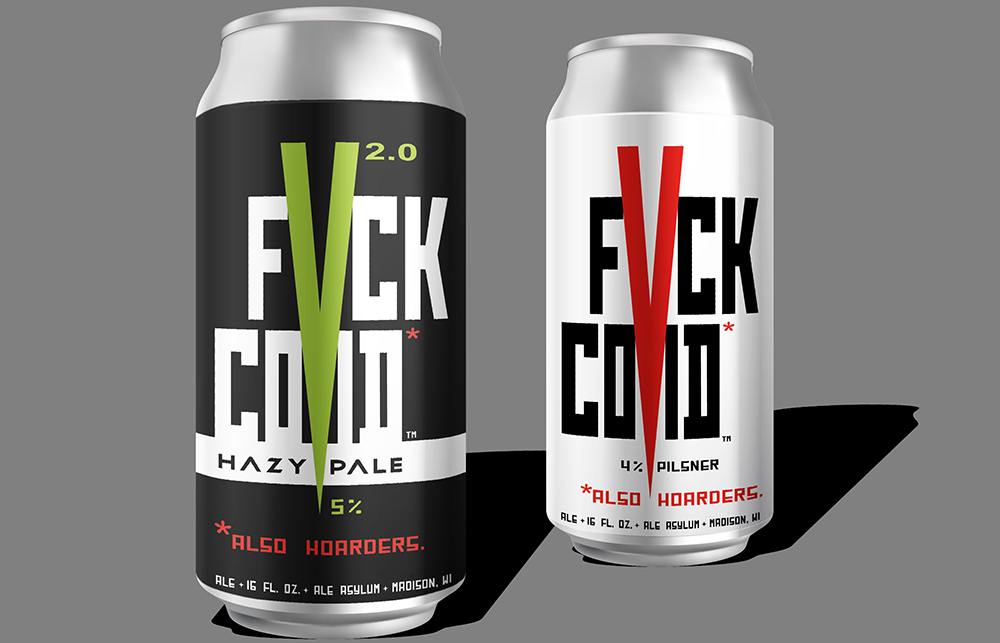
在新冠疫情爆發(fā)前,精釀啤酒行業(yè)呈爆發(fā)式增長的好日子便已經(jīng)劃上句號,不過小型獨(dú)立釀酒企業(yè)的數(shù)量仍然在逐年增加,而且當(dāng)時(shí)沒有任何跡象顯示這種趨勢將會出現(xiàn)重大調(diào)整。然而,待到春季,小型釀酒企業(yè)過多的情況可能會造成毀滅性后果。
啤酒協(xié)會(Brewers Association)的首席經(jīng)濟(jì)學(xué)家巴特?沃森表示,在居家辦公期間,雖然有很多人會通過Zoom與親友同事聚會玩樂,白天暢飲也是常事,但今年迄今為止,啤酒銷售總額并未出現(xiàn)太大變化,加上酒吧大門緊鎖、餐館鮮啤銷售陷于停滯,為了“活下去”,小型啤酒企業(yè)不得不調(diào)整自己的商業(yè)模式。
許多啤酒企業(yè)提升了外帶啤酒的產(chǎn)能,也有少數(shù)企業(yè)已經(jīng)能夠?yàn)榭蛻籼峁┧拓浬祥T服務(wù),不過黑云壓城之際,市場需求下跌或許只是時(shí)間問題。
沃森說:"新冠疫情沖擊小型釀酒企業(yè)時(shí)恰逢一年之中的銷售旺季,釀酒企業(yè)要靠這段時(shí)間賺的錢來撐過淡季,現(xiàn)在這些企業(yè)可能還撐得下去,不過還得看冬季的情況……碰到這種事,企業(yè)肯定會出現(xiàn)現(xiàn)金儲備減少、財(cái)務(wù)受損的問題,因此我認(rèn)為,未來6到12個(gè)月,釀酒企業(yè)的倒閉率可能會上升。”
Ale Asylum位于麥迪遜,其聯(lián)合創(chuàng)始人奧托?迪爾巴稱,雖然公司自營啤酒餐廳的露臺很大,重新開放后生意也很不錯(cuò),而且公司推出的“Fvck Covid”啤酒備受追捧,一經(jīng)推出便迅速售罄,但今年到目前為止,公司的業(yè)務(wù)仍然下降了40%之多。
為了降低病毒傳播的幾率,Ale Asylum的室內(nèi)餐廳目前仍然處于關(guān)閉狀態(tài)。而隨著冬季的到來,重啟室內(nèi)餐廳更加無望。這就帶來了另一個(gè)問題。
迪爾巴說:“由于我們同時(shí)也生產(chǎn)啤酒,如果要隔離14天,我們的生意就完了。”
Ale Asylum現(xiàn)在的業(yè)務(wù)亮點(diǎn)無疑是Fvck Covid,這種比爾森啤酒(和Fvck Covid 2.0朦朧IPA)不僅在該公司的自營餐廳及威斯康星州、伊利諾伊州等傳統(tǒng)市場廣受歡迎,還在另外12個(gè)州贏得了市場的歡心。該公司隨后還將推出Apocalypse Bingo系列啤酒與Fvck Covid一同銷售,Murder Hornet Pale Ale將作為該系列的首款產(chǎn)品率先上市。
雖然多數(shù)啤酒企業(yè)已經(jīng)用罐裝啤酒取代了生啤和酒吧業(yè)務(wù),但對沒有自營裝罐生產(chǎn)線的小型啤酒企業(yè)而言,這無疑是一個(gè)新的挑戰(zhàn)。移動罐裝企業(yè)近來業(yè)務(wù)非常繁忙,很難抽出時(shí)間開展啤酒裝罐業(yè)務(wù),即便雙方可以展開合作,裝罐啤酒也會進(jìn)一步削減啤酒企業(yè)的利潤。
而即將出現(xiàn)的易拉罐短缺問題或許更為令人擔(dān)心。全球最大的鋁罐制造商——BallCorp.公司上月告訴投資者,北美易拉罐的年需求量已經(jīng)從80億增長至100億,而該公司目前正在設(shè)法跟上這種需求的增長。
沃森表示:"易拉罐短缺降低了部分啤酒企業(yè)調(diào)整業(yè)務(wù)的能力。有些企業(yè)在重新套印出現(xiàn)錯(cuò)印的易拉罐,有些則在考慮銷售瓶裝啤酒,不過市場上沒有那么多提供裝瓶服務(wù)的公司……現(xiàn)在真沒有什么好的解決辦法。除非可以提升裝罐能力,否則這個(gè)問題無法解決。”
雖然許多啤酒企業(yè)的直銷銷量大幅增長,但其擴(kuò)大分銷渠道、補(bǔ)充收入來源的努力尚未取得太大進(jìn)展。而與啤酒經(jīng)銷商合作往往意味著長遠(yuǎn)的影響,因此也不會一蹴而就。不過也有啤酒企業(yè)正在通過與啤酒運(yùn)輸服務(wù)公司Tavour合作來繞開這一障礙。
今年到目前為止,已經(jīng)有90家啤酒企業(yè)與Tavour建立了合作關(guān)系,而啤酒愛好者們也用自己的方式做出了回應(yīng)——自3月以來,該公司的業(yè)務(wù)已經(jīng)增長了兩倍之多。
WeldWerks的聯(lián)合創(chuàng)始人兼首席釀酒師尼爾?費(fèi)舍爾說:“對許多產(chǎn)能過剩的啤酒企業(yè)而言,Tavour一直是它們最棒的合作伙伴。”WeldWerks是一家位于科羅拉多州格里利的釀酒公司。
自3月以來,該公司的銷售額持續(xù)增長,員工人數(shù)也增加了33%,可以說是本次疫情中的幸運(yùn)兒之一。
費(fèi)舍爾表示:"我們非常幸運(yùn),絕對屬于少數(shù)派。我們恰好擁有許多合適的商業(yè)模式,能夠迅速做出調(diào)整,適應(yīng)新的市場環(huán)境。因?yàn)楣疽?guī)模不大,所以不需要提前18個(gè)月對業(yè)務(wù)進(jìn)行預(yù)測和規(guī)劃,也就不會有太多靜態(tài)摩擦,不過我們又不算太小,所以也可以擁有自營裝罐生產(chǎn)線這樣的資產(chǎn),還能夠拿到需要的易拉罐。”
不過,Weldwerks確實(shí)屬于個(gè)案。據(jù)啤酒研究會(Beer Institute)、啤酒協(xié)會、全美啤酒批發(fā)商協(xié)會(National Beer Wholesalers Association)和美國飲料批發(fā)商協(xié)會(American Beverage Licensees)的聯(lián)合研究估計(jì),受疫情影響,美國的啤酒零售額將下降220多億美元,并且在今年年底前啤酒行業(yè)將失去超過651000個(gè)與之相關(guān)的工作崗位。
據(jù)得克薩斯州工藝釀酒商協(xié)會(Texas Craft Brewers Guild.)的一項(xiàng)調(diào)查顯示,得克薩斯州多達(dá)三分之二的地方性精釀啤酒企業(yè)可能被迫在2021年年底永久關(guān)閉。
迪爾巴說:“對很多啤酒企業(yè)而言,眼下正是生死存亡之秋,是它們正真需要幫助的時(shí)候。”(財(cái)富中文網(wǎng))
譯者:梁宇
審校:夏林
在新冠疫情爆發(fā)前,精釀啤酒行業(yè)呈爆發(fā)式增長的好日子便已經(jīng)劃上句號,不過小型獨(dú)立釀酒企業(yè)的數(shù)量仍然在逐年增加,而且當(dāng)時(shí)沒有任何跡象顯示這種趨勢將會出現(xiàn)重大調(diào)整。然而,待到春季,小型釀酒企業(yè)過多的情況可能會造成毀滅性后果。
啤酒協(xié)會(Brewers Association)的首席經(jīng)濟(jì)學(xué)家巴特?沃森表示,在居家辦公期間,雖然有很多人會通過Zoom與親友同事聚會玩樂,白天暢飲也是常事,但今年迄今為止,啤酒銷售總額并未出現(xiàn)太大變化,加上酒吧大門緊鎖、餐館鮮啤銷售陷于停滯,為了“活下去”,小型啤酒企業(yè)不得不調(diào)整自己的商業(yè)模式。
許多啤酒企業(yè)提升了外帶啤酒的產(chǎn)能,也有少數(shù)企業(yè)已經(jīng)能夠?yàn)榭蛻籼峁┧拓浬祥T服務(wù),不過黑云壓城之際,市場需求下跌或許只是時(shí)間問題。
沃森說:"新冠疫情沖擊小型釀酒企業(yè)時(shí)恰逢一年之中的銷售旺季,釀酒企業(yè)要靠這段時(shí)間賺的錢來撐過淡季,現(xiàn)在這些企業(yè)可能還撐得下去,不過還得看冬季的情況……碰到這種事,企業(yè)肯定會出現(xiàn)現(xiàn)金儲備減少、財(cái)務(wù)受損的問題,因此我認(rèn)為,未來6到12個(gè)月,釀酒企業(yè)的倒閉率可能會上升。”
Ale Asylum位于麥迪遜,其聯(lián)合創(chuàng)始人奧托?迪爾巴稱,雖然公司自營啤酒餐廳的露臺很大,重新開放后生意也很不錯(cuò),而且公司推出的“Fvck Covid”啤酒備受追捧,一經(jīng)推出便迅速售罄,但今年到目前為止,公司的業(yè)務(wù)仍然下降了40%之多。
為了降低病毒傳播的幾率,Ale Asylum的室內(nèi)餐廳目前仍然處于關(guān)閉狀態(tài)。而隨著冬季的到來,重啟室內(nèi)餐廳更加無望。這就帶來了另一個(gè)問題。
迪爾巴說:“由于我們同時(shí)也生產(chǎn)啤酒,如果要隔離14天,我們的生意就完了。”
Ale Asylum現(xiàn)在的業(yè)務(wù)亮點(diǎn)無疑是Fvck Covid,這種比爾森啤酒(和Fvck Covid 2.0朦朧IPA)不僅在該公司的自營餐廳及威斯康星州、伊利諾伊州等傳統(tǒng)市場廣受歡迎,還在另外12個(gè)州贏得了市場的歡心。該公司隨后還將推出Apocalypse Bingo系列啤酒與Fvck Covid一同銷售,Murder Hornet Pale Ale將作為該系列的首款產(chǎn)品率先上市。
雖然多數(shù)啤酒企業(yè)已經(jīng)用罐裝啤酒取代了生啤和酒吧業(yè)務(wù),但對沒有自營裝罐生產(chǎn)線的小型啤酒企業(yè)而言,這無疑是一個(gè)新的挑戰(zhàn)。移動罐裝企業(yè)近來業(yè)務(wù)非常繁忙,很難抽出時(shí)間開展啤酒裝罐業(yè)務(wù),即便雙方可以展開合作,裝罐啤酒也會進(jìn)一步削減啤酒企業(yè)的利潤。
而即將出現(xiàn)的易拉罐短缺問題或許更為令人擔(dān)心。全球最大的鋁罐制造商——BallCorp.公司上月告訴投資者,北美易拉罐的年需求量已經(jīng)從80億增長至100億,而該公司目前正在設(shè)法跟上這種需求的增長。
沃森表示:"易拉罐短缺降低了部分啤酒企業(yè)調(diào)整業(yè)務(wù)的能力。有些企業(yè)在重新套印出現(xiàn)錯(cuò)印的易拉罐,有些則在考慮銷售瓶裝啤酒,不過市場上沒有那么多提供裝瓶服務(wù)的公司……現(xiàn)在真沒有什么好的解決辦法。除非可以提升裝罐能力,否則這個(gè)問題無法解決。”
雖然許多啤酒企業(yè)的直銷銷量大幅增長,但其擴(kuò)大分銷渠道、補(bǔ)充收入來源的努力尚未取得太大進(jìn)展。而與啤酒經(jīng)銷商合作往往意味著長遠(yuǎn)的影響,因此也不會一蹴而就。不過也有啤酒企業(yè)正在通過與啤酒運(yùn)輸服務(wù)公司Tavour合作來繞開這一障礙。
今年到目前為止,已經(jīng)有90家啤酒企業(yè)與Tavour建立了合作關(guān)系,而啤酒愛好者們也用自己的方式做出了回應(yīng)——自3月以來,該公司的業(yè)務(wù)已經(jīng)增長了兩倍之多。
WeldWerks的聯(lián)合創(chuàng)始人兼首席釀酒師尼爾?費(fèi)舍爾說:“對許多產(chǎn)能過剩的啤酒企業(yè)而言,Tavour一直是它們最棒的合作伙伴。”WeldWerks是一家位于科羅拉多州格里利的釀酒公司。
自3月以來,該公司的銷售額持續(xù)增長,員工人數(shù)也增加了33%,可以說是本次疫情中的幸運(yùn)兒之一。
費(fèi)舍爾表示:"我們非常幸運(yùn),絕對屬于少數(shù)派。我們恰好擁有許多合適的商業(yè)模式,能夠迅速做出調(diào)整,適應(yīng)新的市場環(huán)境。因?yàn)楣疽?guī)模不大,所以不需要提前18個(gè)月對業(yè)務(wù)進(jìn)行預(yù)測和規(guī)劃,也就不會有太多靜態(tài)摩擦,不過我們又不算太小,所以也可以擁有自營裝罐生產(chǎn)線這樣的資產(chǎn),還能夠拿到需要的易拉罐。”
不過,Weldwerks確實(shí)屬于個(gè)案。據(jù)啤酒研究會(Beer Institute)、啤酒協(xié)會、全美啤酒批發(fā)商協(xié)會(National Beer Wholesalers Association)和美國飲料批發(fā)商協(xié)會(American Beverage Licensees)的聯(lián)合研究估計(jì),受疫情影響,美國的啤酒零售額將下降220多億美元,并且在今年年底前啤酒行業(yè)將失去超過651000個(gè)與之相關(guān)的工作崗位。
據(jù)得克薩斯州工藝釀酒商協(xié)會(Texas Craft Brewers Guild.)的一項(xiàng)調(diào)查顯示,得克薩斯州多達(dá)三分之二的地方性精釀啤酒企業(yè)可能被迫在2021年年底永久關(guān)閉。
迪爾巴說:“對很多啤酒企業(yè)而言,眼下正是生死存亡之秋,是它們正真需要幫助的時(shí)候。”(財(cái)富中文網(wǎng))
譯者:梁宇
審校:夏林
While the days of explosive growth were already behind the craft beer industry when the COVID-19 pandemic hit, small independent brewers were still increasing their numbers each year—and there was no sign that any major reversal was on the way. Yet by spring, the numbers could be devastating.
Despite those many Zoom happy hours and tales of day drinking as you work from home, total beer sales haven’t changed much year to date, says Bart Watson, chief economist for the Brewers Association. And small breweries have had to pivot their business models to stay in business, as taprooms shut down, and restaurant draft business dried up.
Many have increased their production capacity to sell to-go beer. A limited number have been able to do direct shipping to customers. The looming cloud on the horizon, though, is that demand is about to dip.
“COVID really hit during the best period of the year for small brewer sales,” says Watson. “This is the time brewers make money to survive the lean times. That might be enough to get them through now, but we’re going to see what the winter brings…An event like this has to be drawing down the cash reserves and causing financial harm, so I do think there’s the potential we’ll see an elevated closure rate over the next six to 12 months.”
At Ale Asylum in Madison, business is down 40% so far this year, says cofounder Otto Dilba. That’s despite the brewery-restaurant having a large patio, which has reopened, a bustling pickup business, and the launch of a wildly successful beer—aptly named “Fvck Covid” —which sells out as soon as they can put it on sale.
The inside dining room at Ale Asylum has stayed shut so far to decrease the chances of the virus spreading. As winter hits, though, that might not be an option. And that presents another problem.
“We’re also a production facility,” he says. “If we had to quarantine for two weeks, our business would go under.”
Fvck Covid has proven to be a bright spot for Ale Asylum. The pilsner (and Fvck Covid 2.0 hazy IPA) has been in high demand not only at the brewery and through Wisconsin and Illinois, the usual distribution range for the brewery, but also in 12 other states as well. Up next is a line of beers called Apocalypse Bingo, which will be sold alongside Fvck Covid. The first beer will be called Murder Hornet Pale Ale.
While most breweries have replaced draft and taproom sales with canned products, that has been more challenging for smaller brewers who don’t have their own canning line. Mobile canning companies have been in high demand, meaning it’s harder to slot time to get the beer into cans—and the cost of working with those services cuts into margins.
Perhaps more concerning, a can shortage is looming. Ball Corp., the world’s largest manufacturer of cans, told investors last month that can demand in North America is growing at a pace of 8 billion to 10 billion cans a year, and it's struggling to keep up.
“That reduces the ability of some brewers to pivot,” says Watson. “Some are re-sleeving misprinted cans. Some people are considering bottling, but there’s not as much mobile bottling options…There really isn’t a great option. This isn’t a problem that’s going to be solved until more canning capacity comes online.”
While many breweries are seeing a surge in direct sales, their efforts to supplement income via wider distribution aren’t progressing as quickly. Partnering with a beer distributor isn’t something that’s normally done quickly since it can have long-term repercussions. But some brewers are sidestepping that hurdle by partnering with Tavour, a beer shipping service.
So far this year, 90 new brewers have partnered with Tavour. And beer lovers have responded. The company’s business has tripled since March.
“They’ve been a great partner for a lot of breweries that did have excess capacity,” says Neil Fisher, cofounder and head brewer at WeldWerks Brewing Co. in Greeley, Colo.
WeldWerks has been one of the fortunate breweries in the pandemic, seeing sales increase and actually increasing its staff by 33% since March.
“We’re definitely in the minority,” says Fisher. “We’ve been very, very fortunate. We just have a lot of the right business model and the ability to adapt very quickly. We’re not so big that we have so much static friction based on long-term forecasts and plans made 18 months in advance…but we’re big enough to have commodities like our own canning line and access to cans.”
WeldWerks is the exception, though. A joint study by the Beer Institute, the Brewers Association, the National Beer Wholesalers Association, and the American Beverage Licensees estimates retail beer sales will drop by more than $22 billion due to the pandemic. And more than 651,000 jobs supported by the U.S. beer industry will be lost by the end of the year because of COVID-19.
In Texas, as many as two-thirds of local craft breweries could be forced to permanently close by the end of 2021, according to a survey from the Texas Craft Brewers Guild.
“This is do-or-die time for a lot of us,” says Dilba. “Right now, your local brewery needs you more than ever.”






